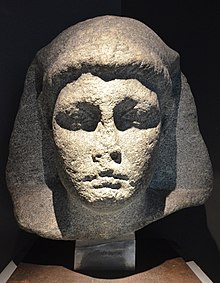Caesarion: Pharaoh & Biological Son of Julius Caesar
 |
| Colossal granite head attributed to Caesarion (Ptolemy XV), son of Cleopatra VII and Julius Caesar, found off the coast of Alexandria, 1st century BC |
Background:
Ptolemy XV Caesar (23 June 47 BC – August 30 BC), nicknamed Caesarion (Καισαρίων, "Little Caesar"), was the last pharaoh of Ptolemaic Egypt, reigning with his mother Cleopatra VII from 2 September 44 BC until her death by 12 August 30 BC, then as sole ruler until his death was ordered by Octavian (who would become the first Roman emperor as Augustus). Caesarion was the eldest son of Cleopatra and the only known biological son of Julius Caesar, after whom he was named. He was the last sovereign member of the Ptolemaic dynasty of Egypt. His mother Cleopatra insisted that he was the son of Roman politician and dictator Julius Caesar, and while he was said to have inherited Caesar's looks and manner, Caesar did not officially acknowledge him. One of Caesar's supporters, Gaius Oppius, even wrote a pamphlet which attempted to prove that Caesar could not have fathered Caesarion. Nevertheless, Caesar may have allowed Caesarion to use his name. The matter became contentious when Caesar's adopted son, Octavian, came into conflict with Cleopatra.
Caesarion spent two of his infant years, from 46 to 44 BC, in Rome, where he and his mother were Caesar's guests at his villa, Horti Caesaris. Cleopatra hoped that her son would eventually succeed his father as the head of the Roman Republic, as well as of Egypt. After Caesar's assassination on 15 March 44 BC, Cleopatra and Caesarion returned to Egypt. Caesarion was named co-ruler by his mother on 2 September 44 BC at the age of three, although he was pharaoh in name only, with Cleopatra keeping actual authority. Cleopatra compared her relationship to her son with that of the Egyptian goddess Isis and her divine child Horus. There is no historical record of Caesarion between 44 BC until the Donations of Antioch in 36 BC. Two years later he also appears at the Donations of Alexandria. Cleopatra and Antony staged both "Donations" to donate lands dominated by Rome and Parthia to Cleopatra's children: Caesarion, the twins Alexander Helios and Cleopatra Selene II, and Ptolemy Philadelphus (the last three were his maternal half-siblings fathered by Mark Antony). Octavian gave public approval to the Donations of Antioch in 36 BC, which have been described as an Antonian strategy to rule the East making use of Cleopatra's unique royal Seleucid lineage in the regions donated.
In 34 BC, Antony granted further eastern lands and titles to Caesarion and his own three children with Cleopatra in the Donations of Alexandria. Caesarion was proclaimed to be a god, a son of [a] god, and "King of Kings". This grandiose title was "unprecedented in the management of Roman client-king relationships" and could be seen as "threatening the 'greatness' of the Roman people". Antony also declared Caesarion to be Caesar's true son and heir. This declaration was a direct threat to Octavian (whose claim to power was based on his status as Julius Caesar's grandnephew and adopted son). These proclamations partly caused the fatal breach in Antony's relations with Octavian, who used Roman resentment over the Donations to gain support for war against Antony and Cleopatra.
Source: Wikipedia
Comments
Post a Comment